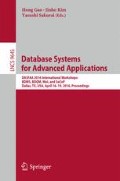Abstract
We propose to design a semi-automatic ontology building approach to create a new taxonomy of the digital economy based on a big data approach – harvesting data by scraping publicly available Web pages of digitally-focused business. The method is based on a small core ontology which provides the basic level concepts in business model. We try to use computational approaches to extracting Web data towards generating concepts and taxonomy of business models in the digital economy, which can help consequently address the important question while exploring new business models in big data era.
Access this chapter
Tax calculation will be finalised at checkout
Purchases are for personal use only
References
Mitchell, G.: How many petabytes is the internet? Focus Science and Technology Magazine (2013). http://sciencefocus.com/qa/how-many-terabytes-data-are-internet
Xiaoguang, Q., Davison, B.D.: Web page classification: features and algorithms. ACM Comput. Surv. 41(2) (2009). Article 12
Bartelt, A., Lamersdorf, W.: A multi-criteria taxonomy of business models in electronic commerce. In: Fiege, L., Mühl, G., Wilhelm, U.G. (eds.) WELCOM 2001. LNCS, vol. 2232, pp. 193–205. Springer, Heidelberg (2001)
Lambert, S.C.: Do we need a ‘real’ taxonomy of e-business models? School of commerce research paper series 06-06 (2006)
Chen, W.H., Cai, Y., Leung, H.F., Li, Q.: Generating ontologies with basic level concepts from folksonomies. Procedia Comput. Sci. 1(1), 573–581 (2010)
Gruber, T.: A translation approach to portable ontology specifications. Knowl. Acquisition 5(2), 199–220 (1993)
Maedche, A., Staab, S.: Ontology learning for the semantic web. IEEE Intell. Syst. 16(2), 72–79 (2001). Special Issue on the Semantic Web
Kietz, J.U., Maedche, A., Volz, R.: A method for semi-automatic ontology acquisition from a corporate intranet. In: Aussenac-Gilles, N., Biebow, B., Szulman, S. (eds.) CEUR Workshop Proceedings, EKAW 2000 Workshop on Ontologies and Texts, Juan-Les-Pins, France, Amsterdam, The Netherlands, vol. 51, pp. 4.1–4.14 (2000). http://CEUR-WS.org/Vol-51
Faure, D., Poibeau, T.: First experiments of using semantic knowledge learned by ASIUM for information extraction task using INTEX. In: Staab, S., Maedche, A., Nedellec, C., Wiemer-Hastings, P. (eds.) Proceedings of the Workshop on Ontology Learning, 14th European Conference on Artificial Intelligence ECAI 2000, Berlin, Germany (2000)
Morin, E.: Automatic acquisition of semantic relations between terms from technical corpora. In: Proceedings of the Fifth International Congress on Terminology and Knowledge Engineering (TKE 1999). TermNet-Verlag, Vienna (1999)
Hahn, U., Schulz, S.: Towards very large terminological knowledge bases: a case study from medicine. In: Hamilton, H.J. (ed.) Canadian AI 2000. LNCS (LNAI), vol. 1822, pp. 176–186. Springer, Heidelberg (2000)
Rosch, E., Mervis, C.B., Gray, W.D., Johnson, D.M., Boyes-Braem, P.: Basic objects in natural categories. Cogn. Psychol. 8(3), 382–439 (1976)
Murphy, G.: The Big Book of Concepts. Bradford Book, Cambridge (2004)
Zhou, W., Liu, Z., Zhao, Y., Xu, L., Chen, G., Wu, Q., Qiang, Y.: A semi-automatic ontology learning based on wordnet and event-based natural language processing. In: 2006 International Conference on Information and Automation, ICIA 2006, pp. 240–244. IEEE, December 2006
The Stanford Parser. http://nlp.stanford.edu/software/lex-parser.shtml
Schultz, J., Liberman, M.: Topic detection and tracking using idf-weighted cosine coefficient. In: Broadcast News Workshop 1999 Proceedings, p. 189 (1999)
Acknowledgment
The work presented in this paper is supported by NEMODE Network + Pilot Study: A Computational Taxonomy of Business Models of the Digital Economy (P55805).
Author information
Authors and Affiliations
Corresponding author
Editor information
Editors and Affiliations
Rights and permissions
Copyright information
© 2016 Springer International Publishing Switzerland
About this paper
Cite this paper
Wu, C., Cai, Y., Zhao, M., Huang, S., Guo, Y. (2016). Generating Computational Taxonomy for Business Models of the Digital Economy. In: Gao, H., Kim, J., Sakurai, Y. (eds) Database Systems for Advanced Applications. DASFAA 2016. Lecture Notes in Computer Science(), vol 9645. Springer, Cham. https://doi.org/10.1007/978-3-319-32055-7_11
Download citation
DOI: https://doi.org/10.1007/978-3-319-32055-7_11
Published:
Publisher Name: Springer, Cham
Print ISBN: 978-3-319-32054-0
Online ISBN: 978-3-319-32055-7
eBook Packages: Computer ScienceComputer Science (R0)

